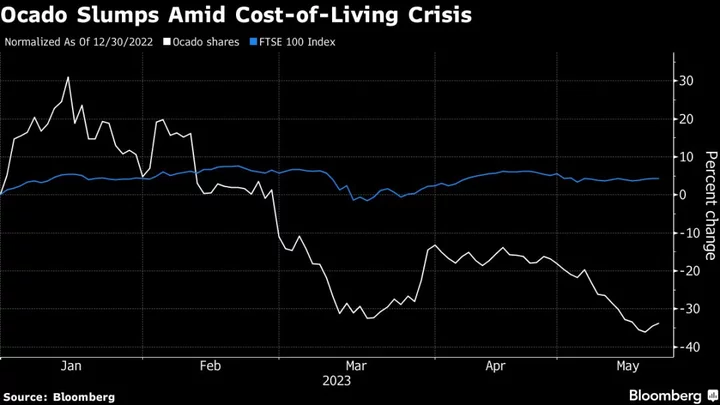Target Corp.’s results have been deteriorating since last year, and the retailer is likely to add to investors’ concerns on Wednesday when it’s expected to report its first sales decline in four years.
Behind the malaise lurk inventory missteps and a consumer pullback from discretionary items such as home goods and clothes — the bread and butter of Target’s “cheap chic” merchandising. There was also a controversy in May over Target’s collection of LGBTQ-themed goods that sparked calls for a boycott.
The company’s plight adds to the pressure on Chief Executive Officer Brian Cornell, who’s trying to cement his legacy after almost a decade at the helm. Having stared down past crises, he’s seeking to navigate this one by improving Target’s food offerings, cutting costs and cracking down on organized theft. But investors have been fleeing, with the chain’s shares giving away almost all their pandemic-era gains over the last 18 months.
“We now have lower confidence in near-term sales trends and profit recovery,” Bobby Griffin, an analyst at Raymond James Financial Inc., said in a recent note to clients. He cut his rating on Target to hold, down two rungs from his previous grade, saying recent evidence suggests the retailer is losing sales momentum.
The company was one of the big winners in US retail during the pandemic. Because Target sold food, it was allowed to stay open early on, and then growth kept surging as Americans gorged on home goods. Revenue — also aided by the highest inflation in a generation — jumped 40% over a three-year span, outpacing retailers such as Walmart Inc. and Dollar General Corp.
But now analysts are predicting that revenue will fall about 4% in Target’s fiscal second quarter, which ended in late July, based on the average of estimates compiled by Bloomberg. There are signs the decline could be even deeper. Bloomberg Second Measure, which tracks anonymous credit and debit card transactions, recorded an 8.7% drop in Target’s sales during the quarter.
Outlook Risk
The size of the sales decline has the potential to surprise the market, Citigroup Inc. analyst Paul Lejuez said in a report.
As for profit, analysts from Morgan Stanley to Oppenheimer & Co. warn Target is likely to cut its annual earnings forecast from the current level of between $7.75 and $8.75 a share.
Target declined to comment ahead of its earnings release.
But there are certainly some bright spots. A year ago, Target and its competitors, including Walmart, were contending with ballooning inventories as US shoppers abruptly reined in spending on discretionary goods after splurging during the pandemic. That forced deep markdowns that hammered profit margins. In the most recent quarter, operating profit and adjusted earnings probably improved, based on analyst estimates.
Cornell, 64, who is expected to stay on about two more years, is no stranger to turbulence. Early on in his tenure, he shut down an expansion into Canada after Target racked up billions in losses. In 2017, the shares plunged when he ordered price cuts and pushed the retailer to invest in fulfilling online orders from stores. But sales rose and the stores-as-hubs strategy — which was later mimicked by Walmart — paid big dividends when e-commerce boomed during Covid.
The short-term outlook is shaky, however. To mitigate sales weakness, Target is expanding more into food, an area where revenue has been increasing. The Minneapolis-based company has invested in improving its fresh-food offerings and added more items to its private-label goods for bargain hunters. But grocery is a low-margin business, and food and beverages only account for about 20% of Target’s sales.
Pride, Theft
The company is also trying to cut costs by $2 billion to $3 billion in the next few years. And it’s fighting back against organized retail crime. In May, Target said that profit drag from shrink, a retail term that includes losses from theft, would increase by $500 million this year.
Then there’s the controversy over Target’s collection for Pride Month. The company removed some goods, citing an increased threat to employee safety. But that didn’t stop calls for boycotts by conservative groups.
The retailer has bounced back before, including from a major data breach in 2013 — the year before Cornell took over. And the company may pick up more business in the wake of Bed Bath & Beyond Inc.’s collapse. First, however, the CEO will have to figure out how to right the ship.
“Target is well positioned to benefit from an eventual rebound in discretionary categories,” Rupesh Parikh, an analyst at Oppenheimer, wrote in a recent note. In the short term, however, “we expect top-line pressures to persist for at least a few more quarters.”
--With assistance from Tonya Garcia.









